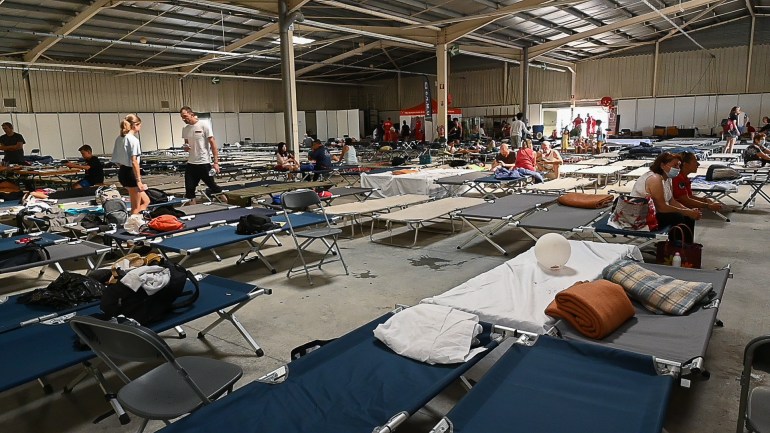Hundreds of deaths were recorded as a result of the severe heat wave that struck Spain and Portugal, thousands of families were evacuated in France, Spain and Portugal, and fires caused by high heat destroyed large areas of forests in southern European countries, and the British authorities declared a state of emergency for the first time across the country due to the heat wave .
In Spain, statistics from the Carlos III Health Institute indicate that the heat wave killed 360 people within a week, while the Portuguese Ministry of Health said that 238 people died as a result of the heat wave between July 7 and 13 of the same month, most of them elderly. Older people with chronic diseases.
Authorities in the southwestern French provinces of Nouvelle-Aquitaine and La Gironde said they had evacuated more than 12,200 people from the forest-affected area by Saturday morning, while more than 1,000 firefighters were trying to control the blazes. On about 100 square kilometers in the territory of "La Gironde".
A side of a shelter for residents of areas in the La Gironde region, southwest France, who were evacuated from their homes due to (European) forest fires
17 fires
In neighboring Spain, firefighters are battling 17 forest fires after days of unusually high temperatures of 45.7 degrees Celsius.
Emergency services in the "Mijas" region (southeast) near the Mediterranean said on Saturday morning that more than 3,000 people were evacuated from their homes in the region due to a large forest fire near the town in Malaga province, a popular destination for European tourists.
Parts of the Extremadura region, near Spain's border with Portugal, were also on fire, as members of the Spanish military emergency unit deployed to help fight the flames.
In Portugal, on Friday, the authorities raised the alert level to red in 5 regions in the center and north, and almost the entire country remained under warning of the outbreak of forest fires, with more than two thousand firefighters fighting 4 fires.
Late on Thursday, Portuguese authorities said one person was killed, 60 injured, and about 900 people evacuated from their homes due to the fires.
The day before yesterday, Portugal recorded its highest temperature in July, reaching 47 degrees Celsius.
Britain's emergency
The Health Security Agency in Britain raised its warning of the impact of heat on health from the third level to the fourth, which is a "national emergency."
The agency said that reaching the fourth level is "when the heat wave is very severe, and / or it is extended so that its effects extend beyond the health and social care system", warning of disease and death among the healthy and not only among the most vulnerable groups.
Some schools in Britain announced the cancellation of school hours on Monday and Tuesday, fearing for the health and safety of students and educational staff, after the authorities announced a red warning for weather temperature that could reach 40 degrees Celsius pic.twitter.com/nYf3J759kC
— Britain in Arabic 🇬🇧 (@TheUKAr) July 16, 2022
UK hospitals have warned of an increase in temperature-related admissions, and train operators have asked passengers to expect trips to be canceled, and the Met Office said there was concern of an increased risk to people's lives in light of unprecedented temperatures touching 40 degrees Celsius for the first time, starting from The day after tomorrow, Monday until next Thursday.
Ireland and Belgium
Met Ireland issued a national weather warning on Sunday, Monday and Tuesday with "exceptionally warm" weather forecast, with daytime temperatures of 25-30 degrees.
Belgian authorities said they are also expecting much higher temperatures next week, with a possible high of 38C in some parts of the country next Tuesday.
“Climate change is driving this wave of heat, just as it is driving every heat wave now,” says Fredericke Otto, a lecturer at Imperial College London. “Greenhouse gas emissions from burning fossil fuels such as coal, gas and oil are making heat waves even hotter. It lasts longer and more frequently.”

